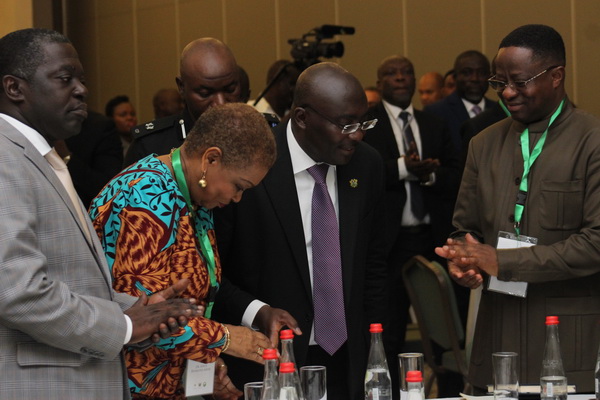
70% Accra houses without titles — Bawumia
The Vice-President, Dr Mahamudu Bawumia, has slammed the Lands Commission for failing to fully digitise its documentation processes, in spite of the resources committed to the commission for that purpose.
"Considerable investment has been made in the Lands Commission as part of initiatives to make its operations digital for effective land management, but it is surprising that only 10 per cent of the legacy data have been digitised.
“I went to the commission recently only to see a chunk of the files containing the legacy data still resting on the shelves and I wonder how vital information can be retrieved within stipulated time. This is unacceptable because we can do better," he said.
Addressing a national land reforms conference in Accra on Wednesday, the Vice-President said about 70 per cent of houses in Accra were without titles and attributed the situation to weak data and documentation systems, coupled with bureaucratic land administration regimes.
“There is a great market value for land and so we need a transparent and effective land administration system to secure the sector because I believe that there is $100 billion on land sitting in Ghana if we can actually get the equity out,” he said.
Conference
The one-day conference was attended by experts in the land sector and key stakeholders drawn from both the private sector and state institutions.
Discussions centred on challenges in land administration, such as encroachment on state lands, multiple sale of land, activities of land guards, land disputes and corruption in the use and management of land.
The forum also looked at the weaknesses in the country’s land administration project which started in 1999 to be able to make inputs on the best way forward to close the gaps to realign it with current social and economic dynamics.
Lands Commission
Dr Bawumia called for a critical review of the current land policy to make it robust enough to comprehensively address the challenges in the country’s land administration system.
He observed that changing dynamics on the social and economic fronts made it imperative for the country to make reforms that would promote the use of modern technologies and systems to ensure effective service delivery in land sector.
Data
He said more needed to be done to promote the use of up-to-date spatial data for effective land administration, describing it as an essential requirement for effective land administration.
He said the lack of efficient spatial data on registered and non-registered lands, especially in the urban areas, accounted for the challenges in urban planning.
Dr Bawumia underscored the important role of the private sector and sustainable funding in ensuring efficient land administration.
LAP
As a result of the constraints to effective land administration in the country, a land policy document was formulated in 1999, commencing a bold reform agenda under the Land Administration Project (LAP).
It was designed to be a long-term intervention, spanning 15 to 25 years, to be implemented in three phases.
The first two phases were implemented between 2003 and 2016, but the second phase was extended to February 28, 2018, meaning that the project ended yesterday.
Some successes were achieved, including the Land Bill currently before Parliament, the passage of the Land Use and Spatial Planning Act, improved court processes through the revision of the rues of court, as well as the automation of land courts and the mapping of 29,000 square kilometres in the northern and southern sectors of the country.
The target of LAP was to reduce the turnaround time in the registration of land deeds from about three months to one month. However, concluded evaluation of four regions indicated that no significant improvement has been recorded.
For instance, 66.7 per cent of applications processed in the Eastern Region were done in four months, while 42 per cent of applications were done in five months in the Upper East Region.
The Northern Region processed 64.7 per cent of its land title applications in two months, while the Western Region did 75 per cent of its registration in a month.
The odds
The Minister of Lands and Natural Resources, Mr John Peter Amewu, described the development as appalling and stressed that more needed to be done to improve the system.
“Another target in the second phase of LAP was to reduce the turnaround time for title registration from seven to three months, but evidence available indicates that only 6.5 per cent of the 2,800 applications which were received for land registration have been processed and completed since the Client Service Access Unit (CSAU) came into force in 2015.
“Even with this, the average turnaround time is eight months and so genuinely we are confronted with nightmares in our land registration system,” he added.
Mr Amewu said the situation was worrying because the country’s ability to build a robust land administration regime had a major implication on foreign direct investments.
“If we do not reform the Lands Commission in a way that will ensure clarity in land acquisition processes and speedy delivery of land titles, investors will come but will not stay,” he said.
He urged all stakeholders in the land administration process to be diligent and change from the old way of doing things and embrace the use of efficient technology to facilitate land management and service delivery.
He said as part of the reforms, the ministry was focusing on the establishment of decentralised satellite offices which would bring land service delivery closer to the public.
Diligence
The Dean of the Faculty of Built Environment at the Kwame Nkrumah University of Science and Technology (KNUST), Professor John Tia Bugri, observed that reforms in the land administration system ought to strike a balance between customary ownership of land and state ownership of the resource.
